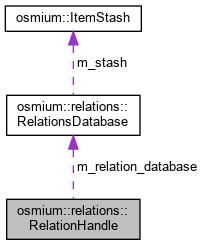#include <relations_database.hpp>
A RelationHandle is used to access elements in a RelationsDatabase.
RelationHandles can not be created by user code, they are only given out by a RelationsDatabase object.
◆ RelationHandle()
| osmium::relations::RelationHandle::RelationHandle |
( |
RelationsDatabase * |
relation_database, |
|
|
std::size_t |
pos |
|
) |
| |
|
inlineprivate |
◆ decrement_members()
| void osmium::relations::RelationHandle::decrement_members |
( |
| ) |
|
|
inlinenoexcept |
Decrement the number of relation members that we want to track.
- Precondition
bool has_all_members() const noexcept
Definition relations_database.hpp:306
◆ has_all_members()
| bool osmium::relations::RelationHandle::has_all_members |
( |
| ) |
const |
|
inlinenoexcept |
Do we have all members? This is true if the number of tracked members is zero.
◆ increment_members()
| void osmium::relations::RelationHandle::increment_members |
( |
| ) |
|
|
inlinenoexcept |
Increment the number of relation members that we want to track.
◆ operator*() [1/2]
| Relation & osmium::relations::RelationHandle::operator* |
( |
| ) |
|
|
inline |
Access the relation stored in the database.
◆ operator*() [2/2]
| const Relation & osmium::relations::RelationHandle::operator* |
( |
| ) |
const |
|
inline |
Access the relation stored in the database.
◆ operator->() [1/2]
| Relation * osmium::relations::RelationHandle::operator-> |
( |
| ) |
|
|
inline |
Call a function on the relation stored in the database.
◆ operator->() [2/2]
| const Relation * osmium::relations::RelationHandle::operator-> |
( |
| ) |
const |
|
inline |
Call a function on the relation stored in the database.
◆ pos()
| std::size_t osmium::relations::RelationHandle::pos |
( |
| ) |
const |
|
inlinenoexcept |
◆ relation_database()
◆ remove()
| void osmium::relations::RelationHandle::remove |
( |
| ) |
|
|
inline |
Remove the relation referred to by this handle from the database. All handles referring to this database element become invalid.
◆ set_members()
| void osmium::relations::RelationHandle::set_members |
( |
std::size_t |
value | ) |
|
|
inlinenoexcept |
Set the number of relation members that we want to track.
◆ RelationsDatabase
◆ m_pos
| std::size_t osmium::relations::RelationHandle::m_pos |
|
private |
◆ m_relation_database
The documentation for this class was generated from the following file:
